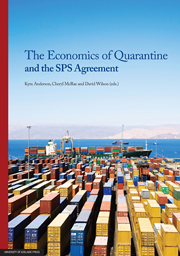Book contents
- Frontmatter
- Contents
- List of tables, figures and boxes
- Acronyms
- Preface
- List of contributors
- 1 Introduction
- PART I The multilateral rules under WTO
- PART II The ‘appropriate level of protection’
- PART III Adding more economics to risk analysis
- PART IV Specific health and environmental risks from trade
- PART V Conclusion
- APPENDIX The legal text of the SPS Agreement
1 - Introduction
Published online by Cambridge University Press: 05 June 2013
- Frontmatter
- Contents
- List of tables, figures and boxes
- Acronyms
- Preface
- List of contributors
- 1 Introduction
- PART I The multilateral rules under WTO
- PART II The ‘appropriate level of protection’
- PART III Adding more economics to risk analysis
- PART IV Specific health and environmental risks from trade
- PART V Conclusion
- APPENDIX The legal text of the SPS Agreement
Summary
The Uruguay Round of multilateral trade negotiations, culminating in the GATT Secretariat being transformed into the World Trade Organization (WTO) on 1 January 1995, has altered forever the process of quarantine policy-making by national governments. On the one hand, WTO member countries retain the right to protect the life and health of their people, plants and animals from the risks of hazards such as pests and diseases arising from the importation of goods. On the other hand, the WTO's Agreement on Sanitary and Phytosanitary Measures (the SPS Agreement) requires that quarantine measures be determined in a manner that is transparent, consistent, scientifically based, and the least trade-restrictive. This tension between national sovereignty and international obligation is aggravated by the vagueness of wording in the SPS Agreement, and has led already to several contentious cases coming before the WTO's Dispute Settlement Body. It has forced national governments to review and in many cases to consider reforming their quarantine policies, and in the process to try to understand how best to implement the SPS Agreement.
Simultaneously, national governments the world over are under pressure from their constituents to bring more rational economic thinking to bear on all areas of policy making. Quarantine policy is not immune from this pressure for better economic governance. Yet the SPS Agreement seems to ignore important economic dimensions of quarantine policy, most notably the cost of those policies to consumers. Perhaps this is a reflection of the fact that quarantine agencies (who supplied the drafters of the SPS Agreement) have focused their attention on the scientific aspects of quarantine and not consulted economists, even as consultants, and, partly as a result, the economics profession has paid little attention to quarantine issues in the past.
- Type
- Chapter
- Information
- Publisher: The University of Adelaide PressPrint publication year: 2012

